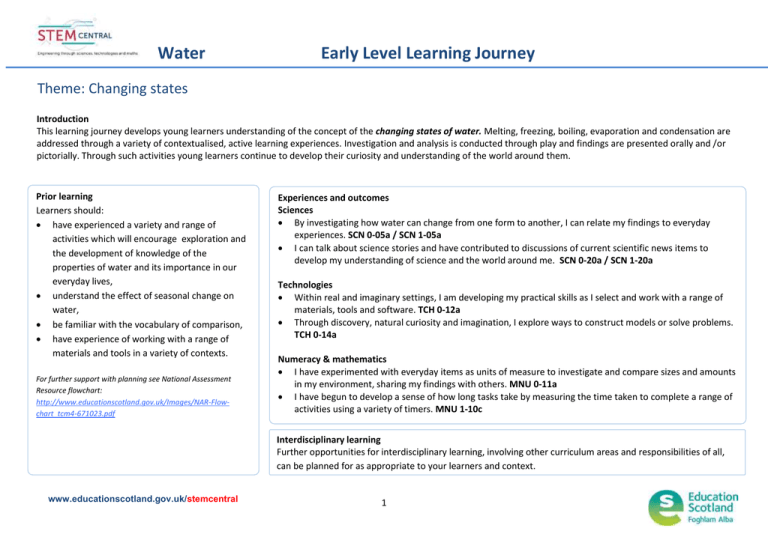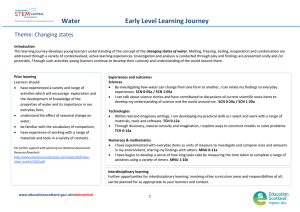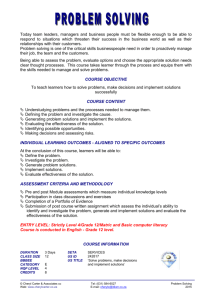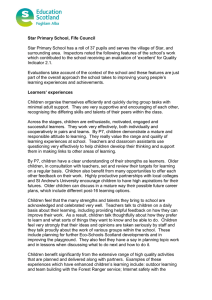Water ...
advertisement

Water Early Level Learning Journey Theme: Changing states Introduction This learning journey develops young learners understanding of the concept of the changing states of water. Melting, freezing, boiling, evaporation and condensation are v addressed through a variety of contextualised, active learning experiences. Investigation and analysis is conducted through play and findings are presented orally and /or pictorially. Through such activities young learners continue to develop their curiosity and understanding of the world around them. Prior learning Learners should: have experienced a variety and range of activities which will encourage exploration and the development of knowledge of the properties of water and its importance in our everyday lives, understand the effect of seasonal change on water, be familiar with the vocabulary of comparison, have experience of working with a range of materials and tools in a variety of contexts. For further support with planning see National Assessment Resource flowchart: http://www.educationscotland.gov.uk/Images/NAR-Flowchart_tcm4-671023.pdf Experiences and outcomes Sciences By investigating how water can change from one form to another, I can relate my findings to everyday experiences. SCN 0-05a / SCN 1-05a I can talk about science stories and have contributed to discussions of current scientific news items to develop my understanding of science and the world around me. SCN 0-20a / SCN 1-20a Technologies Within real and imaginary settings, I am developing my practical skills as I select and work with a range of materials, tools and software. TCH 0-12a Through discovery, natural curiosity and imagination, I explore ways to construct models or solve problems. TCH 0-14a Numeracy & mathematics I have experimented with everyday items as units of measure to investigate and compare sizes and amounts in my environment, sharing my findings with others. MNU 0-11a I have begun to develop a sense of how long tasks take by measuring the time taken to complete a range of activities using a variety of timers. MNU 1-10c Interdisciplinary learning Further opportunities for interdisciplinary learning, involving other curriculum areas and responsibilities of all, can be planned for as appropriate to your learners and context. www.educationscotland.gov.uk/stemcentral 1 Water Stimulus Read and share a variety of stories and poems relating to weather and water (e.g. Noah’s Ark by Lucy Cousins) and share learners own experiences. C Discuss where learners have seen water and identify how it is used locally and in the wider environment. Skills Through research activities and practical investigations learners will develop skills in: inquiry and investigation, observation and making predictions, analytical thinking when making sense of results, interpretation and evaluation of information, presentation and justification of their opinions, planning and organising through the challenges. For more info on skills visit: Building the Curriculum 4 and Sciences Principles and Practice at http://www.educationscotland.gov.uk/sciences Early Level Learning Journey Learning activities Suggested key learning Learning intentions and success criteria should be established through dialogue with learners. Learners can: articulate their understanding of what keeps them warm/cool/dry and why this is important, explain what insulation means and show an understanding of it in everyday contexts, explain what changing temperature means, have knowledge of the different states of water – solid, liquid, gas, explain evaporation in their own words (liquid turning to gas), explain condensation in their own words (gas turning back to liquid), discuss the concept of time and select and use appropriate measuring tools, explain floating & sinking in their own words, select appropriate tools from a selection provided to complete a design challenge to solve problems, use and understand mathematical vocabulary relating to size. www.educationscotland.gov.uk/stemcentral 2 through play corner, select appropriate clothing for warmth – explain and justify choice, use thermometers to record temperature in different contexts and appreciate what the figures mean – relate to senses, read Jordan’s New Jaiket (http://bit.ly/1irE2RB) to introduce concept of insulation – conduct an insulation experiment, investigate water in liquid form (http://bit.ly/1eWhTFE) – soaking sponges /drop food colouring into swirling water. discuss what happens when water turns to ice – use terms liquid & solid. Relate change of water to ice with everyday experiences (http://bit.ly/1mMKmDv) - SSERC log-in required, make ice balls with balloons) / hands with rubber gloves (http://bit.ly/19YOTxk) – explore sensation. What happens to the ice when you hold it/why? investigate speed of melting (http://bit.ly/1cydWY6) – SSERC log-in required. Introduce concept of fair testing, investigate floating and sinking (various materials) then use ice – predict if it will float or sink, read Mr Archemides Bath by Pamela Allen to explain force of buoyancy and floating in very basic terms. Act out the Eureka! moment, evaporation/condensation (http://bit.ly/1aE5Cmk) and water clock activity (http://bit.ly/1jGbZvp), Topical science issues should be included as appropriate. Read about Archimedes’ Principle: http://bit.ly/1c9FBjm Water Reflecting on learning Dialogue with learners will establish how the design principles were addressed. Relate the prompts below to your own context. Breadth – What other curricular areas were covered during this topic? Can you relate learning to areas of real life and /or school learning? http://www.jou rneytoexcellence.org.uk /videos /netherlees cience.as p Personalisation and choice – Were you given the opportunity to choose your own methods of investigation or recording? Depth – Were you given the opportunity to show what you have learned and explain your learning to others? Have you led learning in any way? Coherence – Can you discuss some of the knowledge, understanding and skills you have developed? How have you used these? Can you relate them to real life or other areas of learning? Progression – Have you used the skills and knowledge and understanding you already had of the subject and have you built on these? Relevance – Can you identify an everyday context where you would use your knowledge, understanding and skills? Challenge & enjoyment – Did you enjoy the learning? Why/why not? Was it challenging enough? Can you suggest how to take learning further? Visit Education Scotland’s early years pages: http://bit.ly/1aN4uBK www.educationscotland.gov.uk/stemcentral Early Level Learning Journey Evidence of learning Possible methods of assessment are listed below. Select as appropriate or devise your own. Say: Explain what a thermometer is used for and how it can be used to record changes in temperature (freezing and melting). Write: Re-tell a water-related story through drawings to demonstrate understanding of the processes involved or an experience of their own. Make: Make a water clock. Do: Using stimulus of the Snowman’s Coat (Concept Cartoon 3.2) create an outfit for different weather conditions and justify choices e.g. to prevent snowman melting. For more information see Assessing progress and achievement resource at http://www.educationscotland.gov.uk/sciences Taking learning further Find ways to deepen and extend learning through dialogue with learners. Suggestions to challenge learners: Investigate water cycle YouTube clip (http://bit.ly/1cW0w9t) and PPt (http://bit.ly/1aE5Cmk), Recognise that ice floats and explain why in terms of forces, Help learners and the wider community understand that conserving water is vital to our future and establish the link between clean water and good health, especially in a global context. For more information visit Eco–Schools Scotland at http://bit.ly/LP1WIA See the Sciences Concept Development Paper for more guidance: http://www.educationscotland.gov.uk/sciences 3






